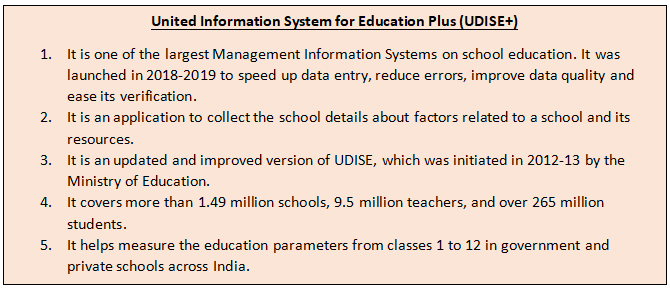- Courses
- GS Full Course 1 Year
- GS Full Course 2 Year
- GS Full Course 3 Year
- GS Full Course Till Selection
- Answer Alpha: Mains 2025 Mentorship
- MEP (Mains Enrichment Programme) Data, Facts
- Essay Target – 150+ Marks
- Online Program
- GS Recorded Course
- Polity
- Geography
- Economy
- Ancient, Medieval and Art & Culture AMAC
- Modern India, Post Independence & World History
- Environment
- Governance
- Science & Technology
- International Relations and Internal Security
- Disaster Management
- Ethics
- NCERT Current Affairs
- Indian Society and Social Issue
- NCERT- Science and Technology
- NCERT - Geography
- NCERT - Ancient History
- NCERT- World History
- NCERT Modern History
- CSAT
- 5 LAYERED ARJUNA Mentorship
- Public Administration Optional
- ABOUT US
- OUR TOPPERS
- TEST SERIES
- FREE STUDY MATERIAL
- VIDEOS
- CONTACT US
One Nation One Student ID
One Nation One Student ID
30-10-2023

Context
Recently, several state governments requested schools to seek parental consent for the creation of a new student identity card known as the Automated Permanent Academic Account Registry (APAAR).
What is the Purpose of APAAR, the ID for Students?
-
About:
- As part of the initiative, each student would receive a lifelong APAAR ID, making it easy for learners, schools, and governments to track academic progress from pre-primary education to higher education.
- APAAR will facilitate access to Digilocker, a digital system for students to securely store their important documents and achievements, such as exam results and report cards.
-
Need For Introduction:
- The introduction of APAAR aims to simplify education and reduce the need for students to carry physical documents.
- Vision: To create a positive change, allowing state governments to track literacy rates, dropout rates, and more, helping them make improvements.
- APAAR aims to reduce fraud and duplicate educational certificates by offering a single, trusted reference for educational institutions.
How Will the APAAR ID Work?
- Linkage with the Academic Bank Credit (ABC): Individuals will have a unique APAAR ID linked to Academic Bank Credit (ABC), a digital storehouse containing student credits earned throughout their learning journey.
-
Change of Schools:
- The student's ABC data is transferred to their new school via sharing their APAAR ID when they change schools within or to another state.
- Students won’t need to provide physical documents or transfer certificates.
-
Enrolment for APAAR:
- Students must register for APAAR and submit basic information including their name, age, date of birth, gender, and a photo. Their Aadhar number will be used to verify this information.
- Students will be required to sign a consent form, and they will have the option of accepting or declining the Ministry of Education's request to share their Aadhar number and demographic data in order to create an APAAR ID.
- In order for the Ministry to use a minor's Aadhar number for UIDAI authentication, the minor's parents must sign the consent form.
- Enrollment in order to generate an APAAR ID is voluntary; it is not mandatory.
What are the Concerns Surrounding APAAR?
- Issues of Privacy: Parents and students express concerns about sharing their Aadhar details due to the risk of their personal information being leaked to third parties.
-
Concerns with UDISE+:
- According to the government, student information will remain confidential and will not be disclosed to third parties, with the exception of entities involved in teaching, including the Unified District Information System for Education Plus (UDISE+) database.
- However, UDISE+ is not required to strictly adhere to any set of guidelines in order to prevent any kind of data breach.

Q. Which of the following provisions of the Constitution does India have a bearing on Education? (UPSC-2012)
- Directive Principles of State Policy
- Rural and Urban Local Bodies
- Fifth Schedule
- Sixth Schedule
- Seventh Schedule
Select the correct answer using the codes given below:
(a) 1 and 2 only
(b) 3, 4 and 5 only
(c) 1, 2 and 5 only
(d) 1, 2, 3, 4 and 5
Ans- (d)



